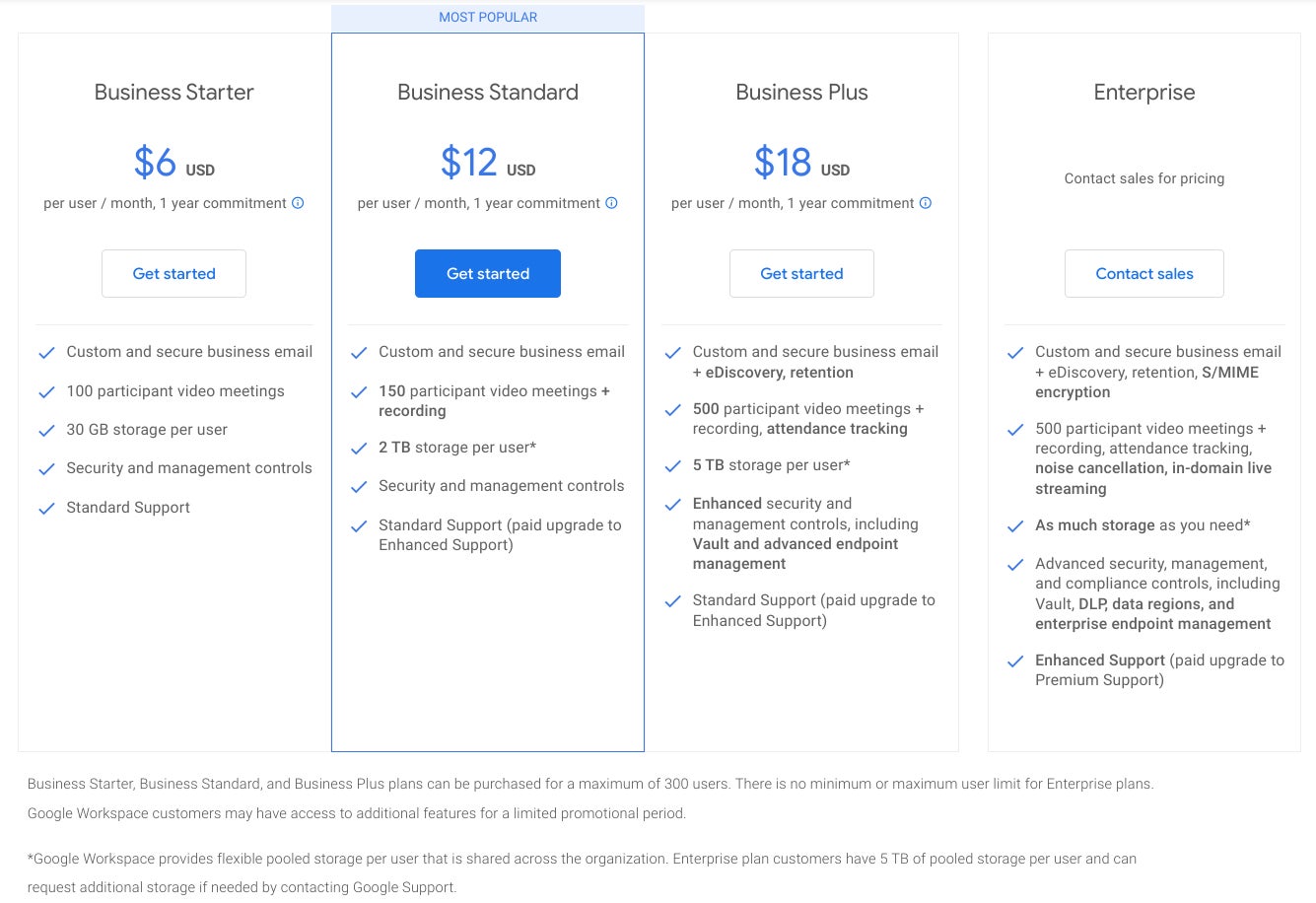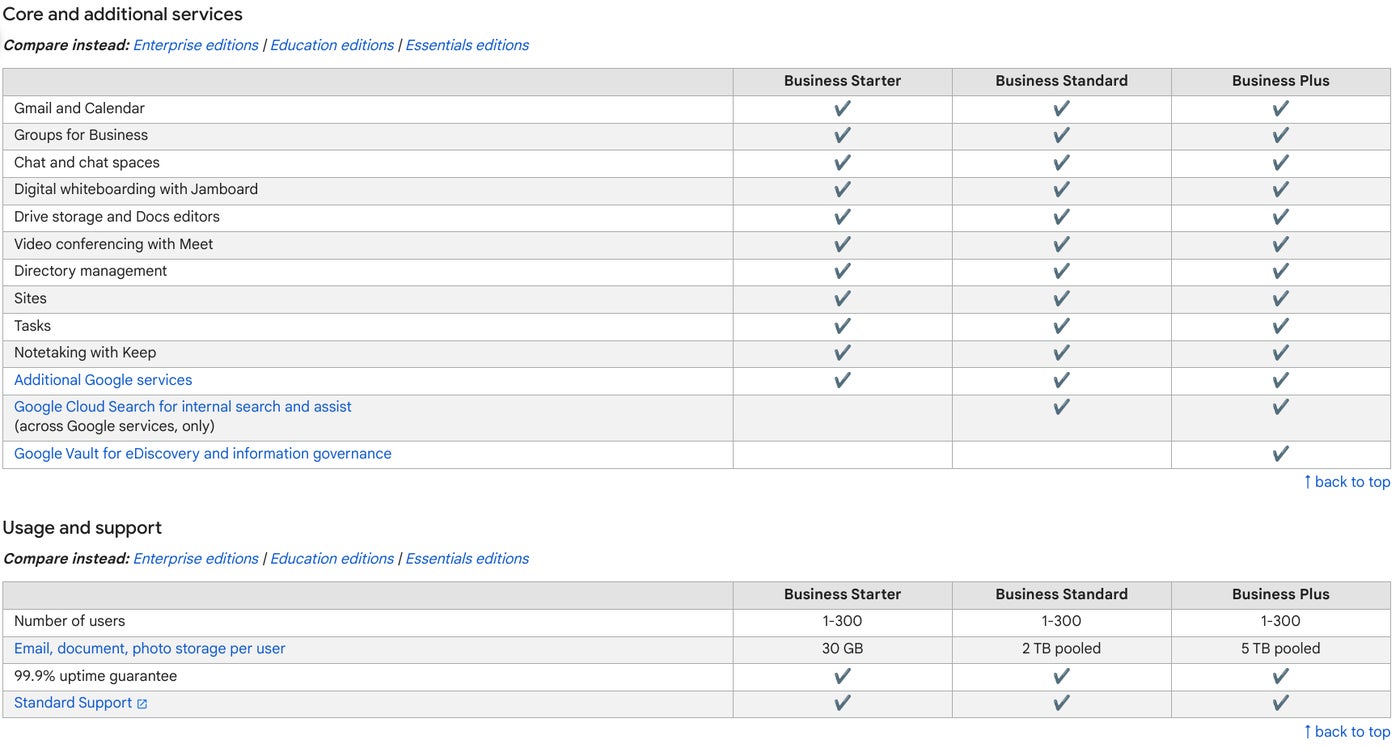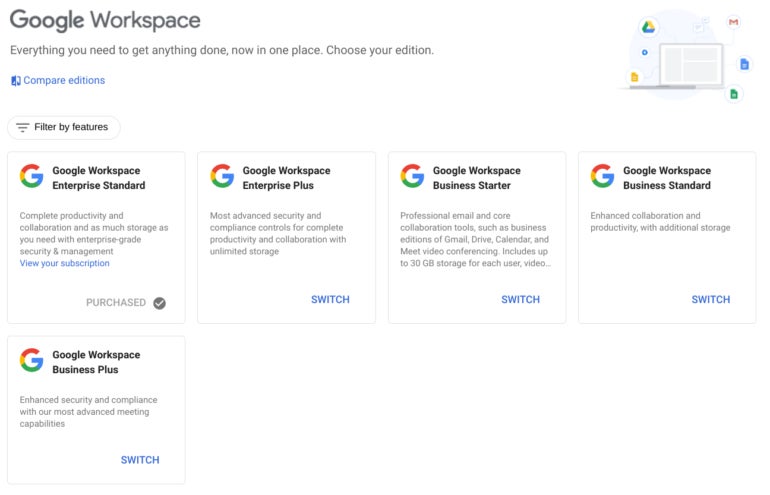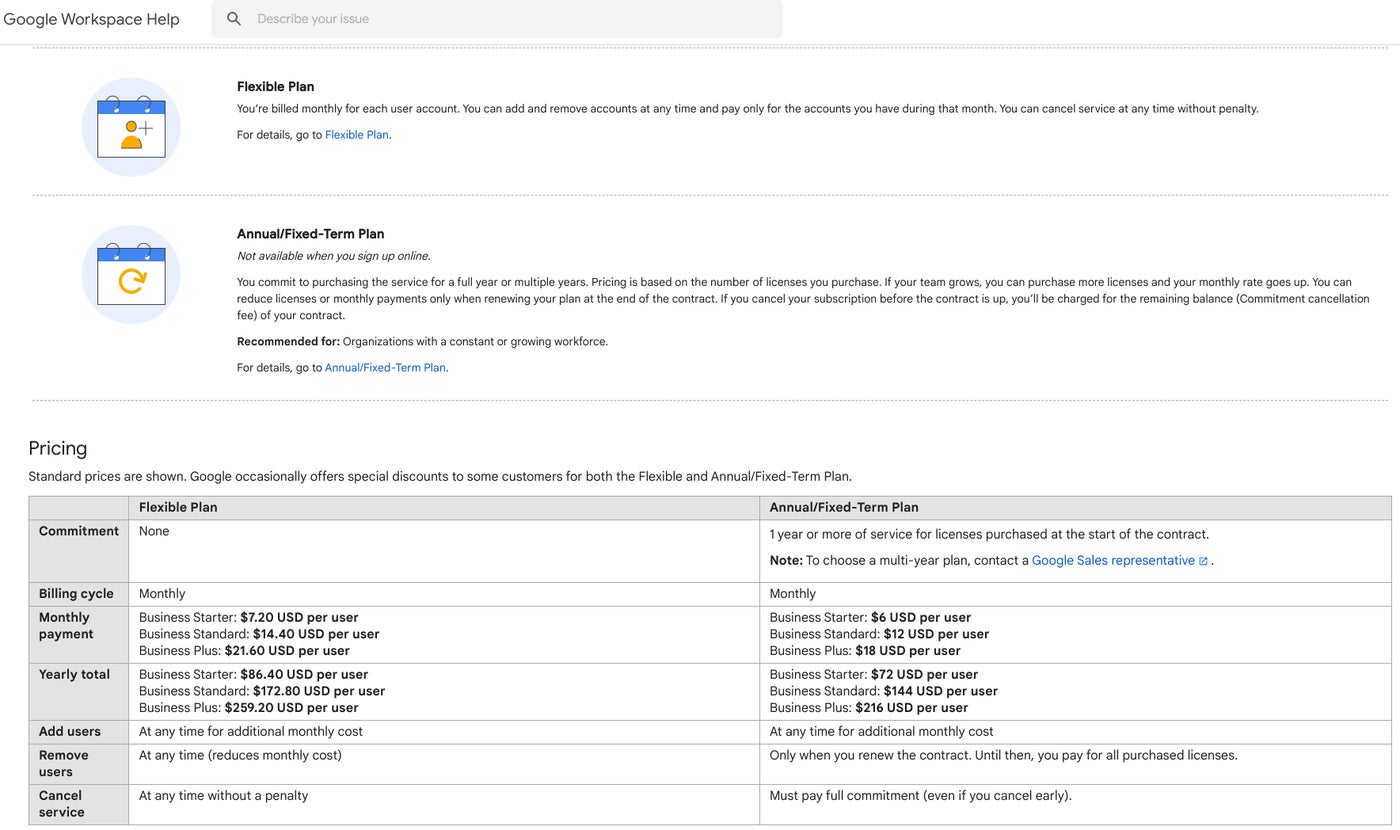
Google announced in February 2023 Workspace price changes. For customers who pay annually, rates remain unchanged. However, customers who pay monthly will pay slightly more for this flexibility. Price changes go into effect March 2023, except for customers with 10 or fewer accounts, for whom changes are deferred until January 2024.
Here’s a look at the current Google Workspace plans and pricing, along with key features you might consider when selecting a plan.
Jump to:
- Plans and pricing for Google Workspace
- Key features of some Google Workspace and G Suite plans
- How to choose a new Google Workspace plan
- How to choose between monthly or annual plans
Plans and pricing for Google Workspace
Google Workspace’s plans
Google Workspace offers three Business plans — Starter, Standard and Plus — and two Enterprise plans — Standard and Plus (Figure A). An additional option, Google Workspace Essentials Starter, allows teams of up to 25 people to use Google’s collaboration tools, such as Google Docs, alongside an existing email and calendar collaboration system.
Figure A

Pricing for Google Workspace Business plans
- Google Workspace Business Starter: $7.20 per user paid monthly or $72 per user paid annually.
- Google Workspace Business Standard: $14.40 per user paid monthly or $144 per user paid annually.
- Google Workspace Business Plus: $21.60 per user paid monthly or $216 per user paid annually.
Pricing for Google Workspace Enterprise plans
Pricing for Enterprise plans is not published. As a legacy customer, when I walked through the upgrade process, the offers I saw included the following; the per user pricing Google offers your organization for Enterprise plans may be different.
- Google Workspace Enterprise Standard: $27.60 per user per month or $276 per user paid annually.
- Google Workspace Enterprise Plus: $36 per user per month or $300 per user paid annually.
Google requires that new customers who seek Enterprise licenses contact Sales. Note that there is no minimum or maximum number of users for Enterprise plans.
Google Workspace plans’ features compared
Google provides a comparison page with a detailed checklist that allows you to review the features offered not only across the Business Starter, Standard and Plus plans, but also across the various Enterprise, Education and Essentials editions (Figure B).
Figure B

Pricing of Microsoft 365 Business plans
The adjusted prices align Google Workspace pricing more closely with Microsoft 365. For example, Microsoft lists pricing for its 365 Business offerings as:
- Microsoft 365 Business Basic: $72 per user paid annually.
- Microsoft 365 Business Standard: $150 per user paid annually.
- Microsoft 365 Business Premium: $264 per user paid annually.
Key features of some Google Workspace plans
The following analysis compares key features of Business Starter, Business Standard and Business Plus plans, along with a few Enterprise plan features.
User limits
The Google Workspace Business plans all add one key constraint not previously present in prior G Suite plans: a maximum of 300 users. If you need more than 300 user accounts, you’ll need an Enterprise plan. Microsoft similarly sets a limit of 300 user accounts on its Microsoft 365 Business plans.
Storage limits
| Google Workspace edition plan | Storage limit |
|---|---|
| Essentials Starter | 15GB per user |
| Business Starter | 30GB per user |
| Business Standard | 2TB per user, pooled |
| Business Plus | 5TB per user, pooled |
| Enterprise Standard/Plus | As much as you need |
All files created, added or modified after June 1, 2021, count toward a user’s storage limit. Files such as Google Docs, Sheets, Slides, Drawings, Forms, Sites, images (e.g., JPG, PNG), PDFs, Word, Excel, PowerPoint and other formats will count toward storage limits.
SEE: Google Workspace storage: 3 essential things you need to know (TechRepublic)
External sharing
Of the three Google Workspace Business plans, both Business Standard and Business Plus offer an administrator the ability to restrict and manage external file sharing with specific domains. An administrator lacks control over external sharing in Business Basic, which may make this plan less appealing where such restrictions may be desired.
Google Meet recording
Business Standard and Business Plus add the ability to record and save Google Meet video conferences. The maximum number of Google Meet participants for the plans are:
- 100 people for Business Starter
- 150 people for Business Standard
- 500 people for Business Plus
Google’s feature comparison page lists several Meet features, such as polling and Q&A and breakout rooms, all of which require a Business Standard or better account. Business Plus and better plans also support attendance tracking in Meet.
E-discovery and retention
Google Vault is the organization’s offering to support administrative e-discovery and data retention. Only Business Plus includes Google Vault; although, organizations on Starter and Standard may select Vault as a paid add-on. When I browsed through my offered pricing, Vault displayed a $6 per user per month add-on price.
How to choose a new Google Workspace plan
If you’re a new customer, your task is relatively simple. Define your needs, select the plan that best fits the balance of your needs and your budget, then help people in your organization get started with Workspace.
If you have been a G Suite or Google Workspace customer, an administrator can sign in to the Admin console to access account options. To do this, the admin would sign in at https://admin.google.com, select the three-horizontal line menu in the upper left corner, then choose Billing, and select Get More Services from the sub-menu.
If you are a current customer, the Google Admin Get More Services page highlights available Google Workspace plans (Figure C).
Figure C

Select any of the options, and the system will display the details of key features your account will either gain or lose. Select your option, address any identified issues and follow any step-by-step instructions to switch.
How to choose between monthly or annual Google Workspace plans
A Google Workspace administrator has the option to choose between monthly or annual account payment plans (Figure D). In a stable situation with sufficient capital and cash flow, the annual option makes the most financial sense.
Figure D

However, not every organization has the ability to pre-pay for accounts for a year. The decision between monthly and annual payments becomes more significant as the number of users increases. Since the total dollar difference can be on the order of thousands of dollars each year, your organization’s cash flow and capital position may affect your decision.
Additionally, if you anticipate major reductions in the number of accounts during the upcoming year (i.e., layoffs), the monthly payment option may be preferable. The marginal cost of a few dollars per month per account may be preferable to locking in a discount by paying an annual price for an account no longer needed at a future date.






